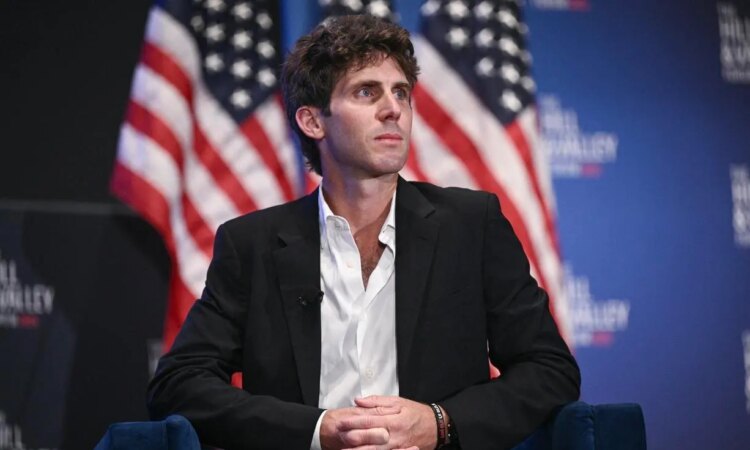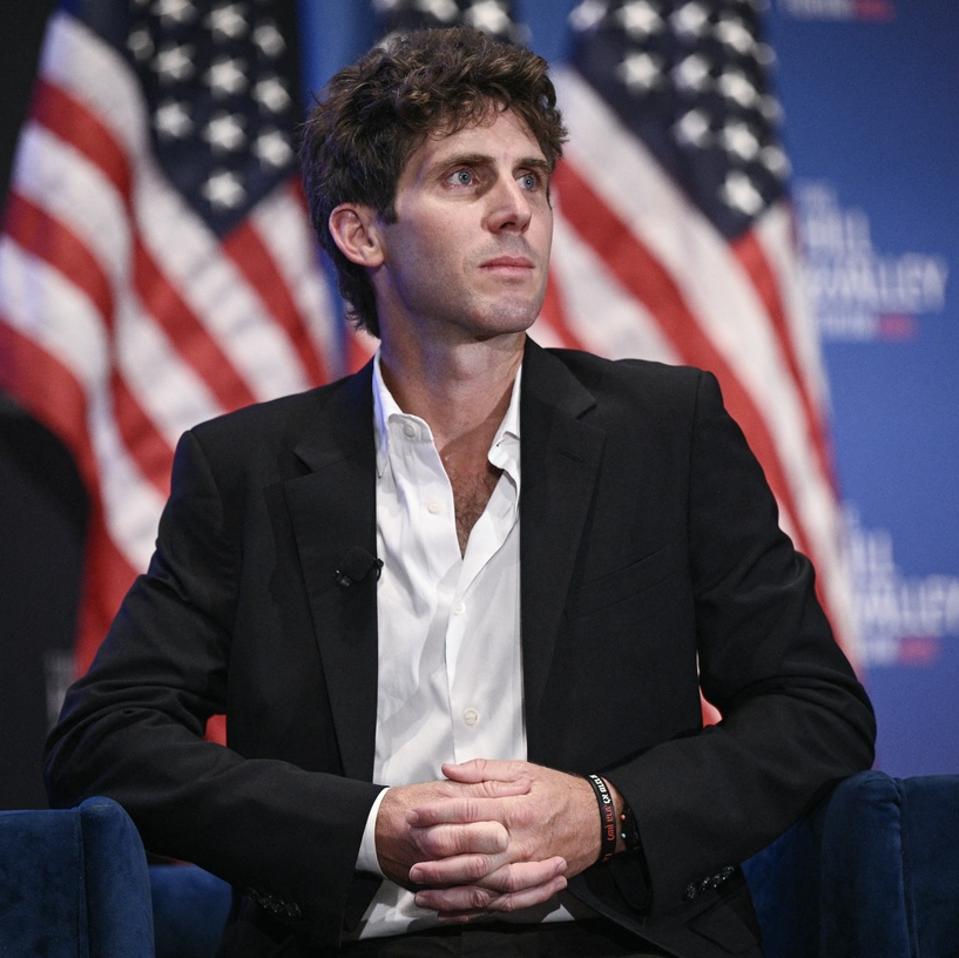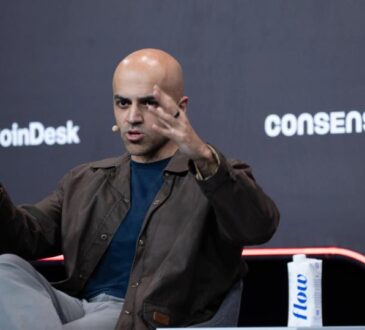
A Partner’s Tweets — and an Executive’s Exit — Became a Test of Venture Capital’s Values
When Sequoia partner Shaun Maguire posted tweets that many founders and investors as well as civil-rights organizations including the Council on American-Islamic Relations (CAIR) and the American-Arab Anti-Discrimination Committee (ADC) condemned as Islamophobic, the venture capital industry’s most powerful firm stayed silent. A month later, Sequoia COO Sumaiya Balbale — its most senior Muslim American executive — departed the firm after an investigation by the firm resulted in no action.
For a company that built its reputation on “long-term relationships and enduring values,” that silence spoke volumes. It wasn’t just a social-media controversy — it underscored how silence, when backed by performance, can pass for conviction.
Partner at Sequoia Capital Shaun Maguire speaks during the Hill & Valley Forum at the US Capitol Visitor Center Auditorium in Washington, DC, on April 30, 2025. (Photo by Brendan SMIALOWSKI / AFP) (Photo by BRENDAN SMIALOWSKI/AFP via Getty Images)
AFP via Getty Images
The Tweets Heard Around Sand Hill Road
On July 19, 2025, he reshared his original post from July 4, 2025 on X that “kicked off the shit storm” in which he stated: “Mamdani comes from a culture that lies about everything. It’s literally a virtue to lie if it advances his Islamist agenda. The West will learn this lesson the hard way.” Critics called the remarks Islamophobic for conflating a Muslim public official’s faith and heritage with deceit and extremism — echoing tropes long used to stigmatize Muslim communities.
Maguire’s intial tweet and subsequent tweets on July 6, 2025 and July 19, 2025 which labeled New York Assemblyman and Democratic mayoral nominee Zohran Mamdani “an “Islamist” and a “wolf in sheep’s clothing” and someone “who defends terrorists” for criticizing Israel’s actions in Gaza — triggered widespread backlash. His tweets circulated across the startup world, especially among founders and investors of color, many of whom voiced outrage.
Yet Sequoia’s official accounts said nothing. No apology. No accountability. That silence became its own kind of statement.
The Context Behind the Tweets
The twitter uproar unfolded amid a highly charged political climate shaped by the Israel-Hamas war. Maguire, a self-described “Jew and Zionist,” has been vocal about rising antisemitism. Mamdani, a progressive legislator, has called for a cease-fire in Gaza and described Israel’s actions as genocide.
Maguire’s widely criticized tweets on July 4, 2025 followed a New York Times story resurfacing Mamdani’s 2009 Columbia University application, which listed his ethnicity as both “Asian” and “Black or African American.” Mamdani — born in Uganda to Indian parents whose family had lived in East Africa for more than a century before immigrating to the U.S. — has said he checked both boxes to reflect his African birth and South Asian heritage.
In response, Maguire accused Mamdani of “coming from a culture that lies about everything” and “advancing an Islamist agenda.” He later clarified that he meant Islamists, not Muslims in general. In a 30-minute follow-up video posted to X, Maguire apologized “to any Muslims who aren’t Islamists,” emphasizing that only a small fraction of Muslims hold extremist views. Political activist Nadia Rahman and the Council on American-Islamic Relations (CAIR) criticized the clarification, stating the initial anti-Muslim comments were dangerous and went unpunished, which normalizes such racism. CAIR stated in an open letter to Sequoia that Maguire’s aggressive speech “raises serious concerns about retaliation, workplace hostility, and the safety of founders and employees who may be subjected to bias or harm under his influence. It is unacceptable for a firm of Sequoia’s stature to provide safe harbor for Islamophobic hate speech while publicly claiming to support inclusive innovation. In light of the grave and ongoing harm caused by Shaun Maguire’s public rhetoric, we urge Sequoia Capital to condemn his conduct and take immediate action to terminate his partnership with your firm. Taking these steps will not only help repair trust with the communities impacted but will also demonstrate a meaningful commitment to upholding the principles of equity, accountability, and professionalism that so many in the industry expect and deserve.”
Maguire’s broader posting history reinforced the perception of his bias. He has previously called footage of dead Palestinian children “fake,” labeled the United Nations a “terrorist organization,” and amplified posts by far-right activist Laura Loomer, who has described herself as a “proud Islamophobe.” According to CAIR, he has issued “veiled threats in response to public criticism, tweeting on July 7, 2025, “You may not know this… but I’ve been watching you,” in response an outspoken figure who condemned his antiMuslim rhetoric. On July 8, he replied to groups and individuals calling for action and accountability in response to his anti-Muslim behavior, stating: “You only embolden me.” CAIR cited these examples as evidence of a pattern of anti-Muslim animus.
If Maguire insists he meant “Islamists, not Muslims,” it’s fair to ask how he might respond if someone claimed “Zionists, not all Jews, use deception to promote a Zionist agenda.” The parallel — contrasting ideology with faith — exposes the moral blind spot at the heart of the controversy.
I reached out to Maguire, Mamdani, and Balbale for comment. Maguire declined to elaborate beyond his public posts. A Sequoia spokesperson said the firm “does not comment on personnel issues.” Mamdani and Balbale did not respond to requests for comment.
The Ripple Effect: The Cost of Institutional Neutrality
As Business Insider recently dubbed him, Maguire has emerged as “Silicon Valley’s most MAGA firebrand,” representing a larger cultural shift in venture capital — where ideological extremism and elite performance now coexist without consequence. CAIR and political activist Nadia Rahman have expressed concern Maguire’s initial anti-Muslim comments were dangerous and went unpunished, which normalizes such racism especially given his stature and influence.
The controversy didn’t stay contained within Sequoia’s walls.
In early July, an open letter circulated among founders and investors demanding action against Maguire. Organized by Wamda founder Fadi Ghandour and other leaders in the Middle East’s tech ecosystem, the petition urged Sequoia to publicly denounce Maguire’s remarks, investigate his conduct, adopt a zero-tolerance policy for hate speech and establish a discrimination-reporting hotline for founders. Dated July 9 and signed by more than 1,100 founders and investors, the letter warned that if Sequoia failed to act, organizers would escalate the matter to the firm’s limited partners — including major sovereign wealth funds and family offices across the Middle East — to demand accountability. Hosam Arab, co-founder and CEO of Gulf fintech company Tabby, which previously raised funding from Sequoia India (now Peak XV Partners) told CNN, “Maguire’s comments struck a chord with a lot of people, just because of the fact that he wasn’t at some no-name shop. It was Sequoia.”
According to the Financial Times, Sequoia’s chief operating officer Sumaiya Balbale — a practicing Muslim who had spoken publicly about how her faith and background shaped her career — resigned in August after five years with the firm. Her resignation came after senior partners declined to discipline Maguire though an internal review found no policy violation.
Sequoia partner Pat Grady later issued a statement defending Maguire as “one of the few people with the courage and mental acuity to wade into these incredibly complex waters,” while adding that he “did not agree with everything my partners say.” The post underscored Sequoia’s internal divide — and how even measured dissent stopped short of accountability.
Balbale’s departure caused consternation among staff and portfolio founders. Widely respected internally and known for her board work with Shake Shack, she was viewed as one of Sequoia’s few senior operators bridging corporate and cultural leadership.
The FT also reported that Sequoia’s managing partner Roelof Botha convened an “all-hands” meeting to contain tensions, emphasizing a philosophy of “institutional neutrality” — effectively arguing that partners are entitled to their own views. Yet that stance fractured morale inside the firm and drew criticism externally, especially from colleagues who felt the firm had failed to meet its own standard of “enduring values.”
Maguire, who has cultivated close ties to Elon Musk and spearheaded investments in SpaceX, xAI, and The Boring Company, remained unapologetic. He walked back portions of his statements, distinguishing between criticism of Islamism and Islam, but refused to retract or apologize. Instead, in a display of bravado, he mentioned his track record to critics on X (now unavailable but still on X): “Dear Haters and Losers, I know you want to cancel me And you think I don’t have a job But in addition to fighting on the internet I’m also a good investor. Here are two drones from a company I’m on the board of, @neros_tech buzzing our killer SecDef @PeteHegseth.”
Abbas Hashmi, Principal at Saudi Family Holdings, offered a public perspective that reflected the frustration simmering across Middle Eastern investor circles.
“Middle Eastern family offices view the recent remarks and the muted response to them as deeply disappointing,” Hashmi said. “In global investment, respect and cultural awareness are not optional — they are fundamental to trust, partnership, and long-term value.”
His comments underscored a growing tension within global venture capital: the widening gap between performance and principle. As the flow of sovereign wealth into Silicon Valley accelerates, firms like Sequoia now navigate not just financial accountability, but cultural and geopolitical scrutiny.
Parsing the Language — Hate Speech and Islamophobia
How the Law Defines Hate Speech and Islamophobia
Forbes
The Silicon Valley Split: Virtue, Visibility, and the Venture Class
Meanwhile, the debate spilled onto X. Yusuf Sherwani, founder of Sequoia-backed Pelago Health, publicly praised Balbale for “standing firm on principle.” Vinod Khosla, founder of Khosla Ventures, reposted Sherwani’s message with three words: “Admire people with principles.”
The endorsement from one of Silicon Valley’s most respected investors turned Balbale’s resignation into a litmus test for moral leadership across the industry. But not everyone agreed. Billionaire investor Bill Ackman, known for his pro-Israel activism, accused Khosla of opportunism:
“@vkhosla, it is not principled to promote and support an attack on @sequoia, a firm with whom you compete for deals, under the guise of admiring people with principles.” (X, Oct 25 2025).
The exchange of tweets — publicly visible on X and verified across multiple threads — revealed how venture capital’s elite now conduct their culture wars in public, where ethics, identity and influence collide.
The Cost of Sequoia’s Silence
While I could not independently verify Sequoia’s LP composition, industry analyses from Skadden and Preqin estimate that 15–20% of capital in large U.S. and European venture funds now originates from Middle Eastern sovereign wealth funds such as PIF and Mubadala. (Skadden 2025 Report)
Sequoia’s silence may carry real business risk, given how deeply interwoven capital and reputation have become. When a firm’s investors span geographies, governments and faith communities, reputation can be considered part of fiduciary duty. In an age when capital and culture are inseparable, even silence can alter the flow of capital.
The response from investors in the Middle East, as reflected by Saudi Family Holdings’ Abbas Hashmi, underscored a growing tension in global venture capital: the widening gap between performance and principle. As the flow of sovereign wealth into Silicon Valley accelerates, firms like Sequoia must navigate not only financial accountability but also cultural and geopolitical scrutiny.
Beyond investor relations, founders are feeling the ripple effects too. For many Muslim and South Asian entrepreneurs, the episode reinforced a perception that U.S. venture firms remain gated — exclusive, selective, and shaped by cultural bias.
Global Money, Moral Fault Lines
The Sequoia controversy exposes a deeper paradox in global capital: the uneasy coexistence between ideological divides and financial interdependence. Venture firms backed by sovereign wealth funds and family offices from the Middle East often rely on the very regions now questioning their values.
That tension is hardly unique to Sequoia. Figures like Jared Kushner and a network of high-profile venture investors operate in a similarly intricate web — one where portfolios are deeply intertwined with Middle Eastern limited partners who are actively diversifying from oil into U.S. technology and venture capital. In this system, capital doesn’t just fund innovation; it shapes alliances, narratives and access.
What happens when values and capital collide? Can trust remain purely transactional in regions still defined by political and religious fault lines? The onus doesn’t rest solely on venture firms — sovereign wealth funds and family offices, too, must decide what their money stands for. Because while most GPs chase capital without questioning its origins, few LPs demand accountability for the behavior their money bankrolls.
At some point, the question becomes unavoidable: Is the partnership really about shared progress — or simply about money?
The Post-Woke Paradox
The backdrop to this controversy is as revealing as the silence itself. In today’s post-woke, post-accountability era, Islamophobia has grown more visible — and more normalized. The pendulum has swung: where public missteps once risked cancellation, overt prejudice now often passes as honest opinion, while moral clarity is dismissed as overreaction.
In this new zeitgeist, performance has become the moral shield. Investors and executives are celebrated for outcomes, not ethics. The same culture that once punished insensitivity now rewards efficiency and dismisses outrage as distraction.
By that standard, Maguire is golden. His record is elite: He’s backed or built unicorns, decacorns, and even hectocorns. His portfolio includes Watershed, LayerZero Labs, xAI, The Boring Company, and SpaceX. Before Sequoia, at GV he co-led investments in Stripe (valued above $50 billion) and earlier co-founded Expanse — acquired by Palo Alto Networks for over $1 billion.
In venture, data determines status. When performance defines virtue, returns outweigh responsibility — and silence becomes the cost of doing business.
Venture Capital Has A Pattern of Cultural Blind Spots
Venture’s moral crisis isn’t new — it’s just evolved. The industry’s last reckoning came during the #MeToo era, when sexual misconduct and bias forced legacy firms like Binary Capital, 500 Startups, Kleiner Perkins, and DFJ to confront their own accountability gaps.
Those reckonings showed that accountability in venture capital usually comes by force, not foresight. They revealed that the industry’s problems aren’t just structural — they stem from individual judgment and power dynamics. And like then, many in power stay silent until the backlash becomes unignorable.
Sequoia’s Accountability Void
For all its influence, Sequoia has yet to release a public statement addressing Maguire’s comments or Balbale’s exit — an omission consistent with its policy of not commenting on personnel matters. But in a controversy that has tested both its internal culture and its global reputation, silence has become its own form of speech.
Some of Maguire’s defenders like Bill Ackman argue that venture firms aren’t democracies — that partners are entitled to personal opinions and that markets, not moral judgments, determine outcomes. Yet as the line between brand and belief continues to blur, neutrality increasingly looks less like prudence and more like neglect.
That tension sits at the heart of Sequoia’s accountability void. For decades, the firm has built its reputation on long-term vision, discipline, and what it calls “enduring values.” But values, when unspoken, are easily misread — and when untested, they lose their meaning.
The Real Stakes for Sequoia — and Silicon Valley
Sequoia’s influence stretches across the global innovation economy—from Stripe, Klarna, and OpenAI to Shein. Its reputation has historically lent credibility to every ecosystem it touches. But in a world where capital and culture are intertwined, silence on alleged bigotry sends a clear message about priorities.
In an era defined by ESG metrics, DEI rollbacks, and geopolitical scrutiny, limited partners are watching more closely than ever. Sequoia’s $20 billion evergreen fund in the U.S. and Europe may not follow a traditional fundraising cycle, but reputational risk travels faster than redemption notices. Even a perception of moral indifference can unsettle the long-term trust that underpins the firm’s access to global capital.
Meanwhile, the successor firms that once formed Sequoia’s global network — Peak XV Partners in India and Southeast Asia, and HongShan in China — are also navigating their own investor scrutiny. The brand’s legacy of excellence, once unified under a single name, now faces a shared test: whether performance alone can outweigh the moral costs of silence.
Moral Leadership: The Missing Mandate
The venture industry often touts itself as the engine of innovation and progress. But moral leadership is part of that mandate, too — whether through so-called vice clauses that restrict investments in harmful sectors or by applying ESG principles as a form of risk management to build more responsible portfolios. Sometimes those standards stop at the firm’s own walls, revealing an industry far more comfortable policing founders than holding itself accountable.
When VCs tell us they back the future, it’s fair to ask whose future they mean.
If Sequoia wants to keep shaping what comes next, it must confront the culture it’s quietly endorsing. The firm’s lack of public response has drawn criticism that silence, in this context, amounts to tacit endorsement.





